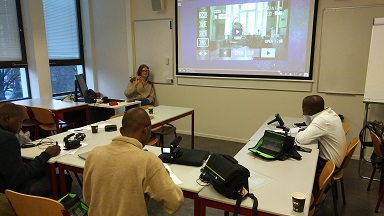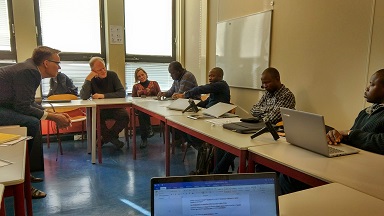Productive two-week workshop 'DigiDogon' (23 January - 4 February 2019)

Issa Sagara, Catherine Krier, Daouda Keita, Wouter van Beek, Éric Jolly, Amadou Guindo.
En français: lire ci-dessous.
During two weeks in January and February 2019, the members of the project DigiDogon – Digitizing Dogon heritage. The legacy of Abirè, the Dogon prophet, led by Wouter van Beek, met in Leiden. The project, financed for three years by JPI on Cultural Heritage, aims at recording and safeguarding parts of the intangible cultural heritage of the Dogon in central Mali.
 Thanks to our colleagues from Audiovisual Anthropology from Leiden University, the research assistants started with training in voice recording, camera handling, and film editing.
Thanks to our colleagues from Audiovisual Anthropology from Leiden University, the research assistants started with training in voice recording, camera handling, and film editing.
After the arrival of the project’s senior researcher, the second week was filled with lectures on various neighbouring topics such as cultural heritage, history and archaeology, religious anthropology, oral history, and Dogon architecture. Several experts from Leiden University and others presented their research and engaged in a lively discussion with the workshop participants from Bamako, Leiden, Paris, and London. Dr. Daouda Keita, professor in Archaeology at the University of Social Sciences and Management of Bamako, and newly appointed director of the National Museum in Mali, held a lecture on cultural heritage sites in Mali and the pillage thereof.
On Saturday 2 February we visited the Afrika Museum in Berg en Dal, especially to take a look at the reconstruction of a Dogon village that was then covered in snow, hence in a completely foreign setting. In spite of the less favourable weather conditions, we profited greatly from the exposition.
To round off these eventful and productive two weeks, we ended with a visit to the National Museum of Ethnology in Leiden and a roundtable discussion with the curator from the Africa department as well as with the former curator. Current issues such as African cultural heritage, especially Dogon objects, and their repatriation were on the agenda.
In conclusion, the two-week-workshop created a reliable basis for the DigiDogon project and future collaboration for the coming years, while strengthening the network among the project members.
Séminaire productif 'DigiDogon' (23 janvier - 4 février 2019)
Lors d’une période de deux semaines en janvier et février 2019, les membres du projet DigiDogon – Digitizing Dogon heritage. The legacy of Abirè, the Dogon prophet, sous la direction de Wouter van Beek se sont réunis pour la première fois à Leyde. Ce projet, qui dure trois ans, a pour but la numérisation des chansons funéraires Dogon.
Grâce à nos collègues du département d’anthropologie audiovisuelle de l’université, les assistants de recherche faisaient d’abord connaissance avec des techniques en anthropologie audiovisuelle : Comment initier les premiers pas dans un travail de cinéaste de documentaire ?
 La deuxième semaine, après l’arrivée des autres chercheurs, les jours étaient pleins de différentes conférences. Plusieurs experts de l’université ou autres présentaient leurs recherches ou participaient à des discussions vivantes avec les chercheurs de Bamako, Leyde, Paris et Londres. Toutes ces conférences traitaient du sujet principal du projet, le patrimoine et la culture Dogon au Mali sous différents angles. Nous avons appris à connaître plusieurs sujets voisins, tels que le patrimoine culturel au Mali, l’histoire et l’archéologie, l’anthropologie religieuse, l’histoire orale, l’architecture Dogon. Dr. Daouda Keita, professeur en archéologie à l'Université des Sciences Sociales et de Gestion de Bamako et nouveau directeur du Musée National au Mali, a tenu une conférence publique intitulée 'Patrimoine culturel malien sabordé au nom d’un islam puritain'.
La deuxième semaine, après l’arrivée des autres chercheurs, les jours étaient pleins de différentes conférences. Plusieurs experts de l’université ou autres présentaient leurs recherches ou participaient à des discussions vivantes avec les chercheurs de Bamako, Leyde, Paris et Londres. Toutes ces conférences traitaient du sujet principal du projet, le patrimoine et la culture Dogon au Mali sous différents angles. Nous avons appris à connaître plusieurs sujets voisins, tels que le patrimoine culturel au Mali, l’histoire et l’archéologie, l’anthropologie religieuse, l’histoire orale, l’architecture Dogon. Dr. Daouda Keita, professeur en archéologie à l'Université des Sciences Sociales et de Gestion de Bamako et nouveau directeur du Musée National au Mali, a tenu une conférence publique intitulée 'Patrimoine culturel malien sabordé au nom d’un islam puritain'.
Le samedi, 2 février, une visite au Afrika Museum in Berg en Dal permis de se familiariser avec la reconstruction d’un village Dogon. Malgré la neige, qui a couvert ce musée en plein air, nous avons bien profité de l’exposition.
Le séminaire s’est clôturé avec une visite de musée du Musée National d’Ethnologie à Leyde et une table ronde en présence de la conservatrice de la section Afrique et de l’ancien conservateur, abordant une thématique assez actuelle – le patrimoine culturel africain, surtout les objets Dogon et leurs rapatriements.
En concluant, les deux semaines de séminaire ont créé une base pour la coopération dans les années qui suivent, en plus des liens entre les chercheurs ont été renforcés.

